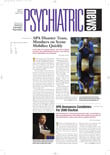For most, the telephone is a way to reach out to friends and family. Now, researchers at the University of California, San Francisco (UCSF), have discovered that the phone may also be an essential tool in depression treatment for some patients.
In a study of 120 patients with multiple sclerosis who had been diagnosed with depression, depression symptoms lifted in those who received either telephone-administered cognitive-behavioral therapy (T-CBT) or telephone-administered supportive emotion-focused therapy (T-SEFT).
However, a greater percentage of those who received T-CBT experienced a reduction in depressive symptoms when compared with those who received T-SEFT.
The results appeared in the September Archives of General Psychiatry.
David Mohr, Ph.D., the study's lead investigator and an associate professor of psychiatry at UCSF, recruited 120 patients who had been diagnosed with multiple sclerosis from the Kaiser Permanente Medical Care Group of Northern California and from regional chapters of the National Multiple Sclerosis Society.
To be included in the study, patients had to have a score of 3 or higher (of a possible score of 6) on the Guy's Neurological Disability Scale, a score of 16 or higher on the Beck Depression Inventory, and 14 or higher on the Hamilton Depression Rating Scale (HDRS).
Researchers used these and other instruments, including the Structured Clinical Interview for DSM-IV and the Positive and Negative Affect Scale, to assess patients for up to a year after the initial assessment.
The patients were randomized to receive T-CBT or T-SEFT from a doctoral-level psychologist once a week for 16 weeks. About the same percentage of patients in both groups were taking an antidepressant during the study.
According to Mohr, T-CBT is similar to standardized, face-to-face CBT, but is administered over the phone. Therapists taught patients skills to help them manage cognitions and behaviors that can contribute to depression.
The goal of T-SEFT was to increase patients' awareness of emotions such as anger that, when unacknowledged, could contribute to depression, according to proponents of the therapy.
The authors said that “patients showed significant improvements in depression and positive affect during the 16 weeks of telephone-administered treatment” but that T-CBT brought about greater improvement in depression than did T-SEFT.
For instance, at week 16, patients in the T-CBT group had significantly improved scores compared with those of the T-SEFT group on the HDRS (p=.02) and the Positive and Negative Affect Scale (p=.008).
In addition, at the week 16 assessment, just eight patients in the T-CBT group still met criteria for a diagnosis of depression, while 18 in the T-SEFT group did (p=.02).
Despite recognizing that telephone-administered psychotherapy is not ideal in all circumstances, Mohr told Psychiatric News that he believes that “patients and therapists can form meaningful, therapeutic relationships over the phone” and that telephone-administered psychotherapy may be the only way to reach some patients who have no access to traditional psychotherapy provided in an office or clinic.
Some patients, for example, may have problems getting to a therapist's office due to physical disabilities, as is the case with some people with multiple sclerosis. Others may face a range of treatment barriers including difficulties related to transportation, time, stigma, and child- or elder-care issues, Mohr noted.
The study's very low attrition rate—5 percent as compared with 25 percent in trials of face-to-face psychotherapy, according to the report—may support the belief that telephone-administered psychotherapy reduces the barriers that keep some individuals from receiving psychotherapy in person, Mohr noted.
However, the report pointed out that T-CBT may not be indicated for all patients and that “it will be important to examine if the outcomes of telephone-administered therapies are equivalent to face-to-face interventions....”
Future research should also investigate whether telephone-administered psychotherapy may be helpful to people with depression who have little or no access to treatment in the wake of a disaster such as Hurricane Katrina, he said.
“What has not been studied is the use of these treatments in disaster situations, where there may be a sudden need for counseling and intervention” for survivors.
Arch Gen Psychiatry 2005 62 1007
